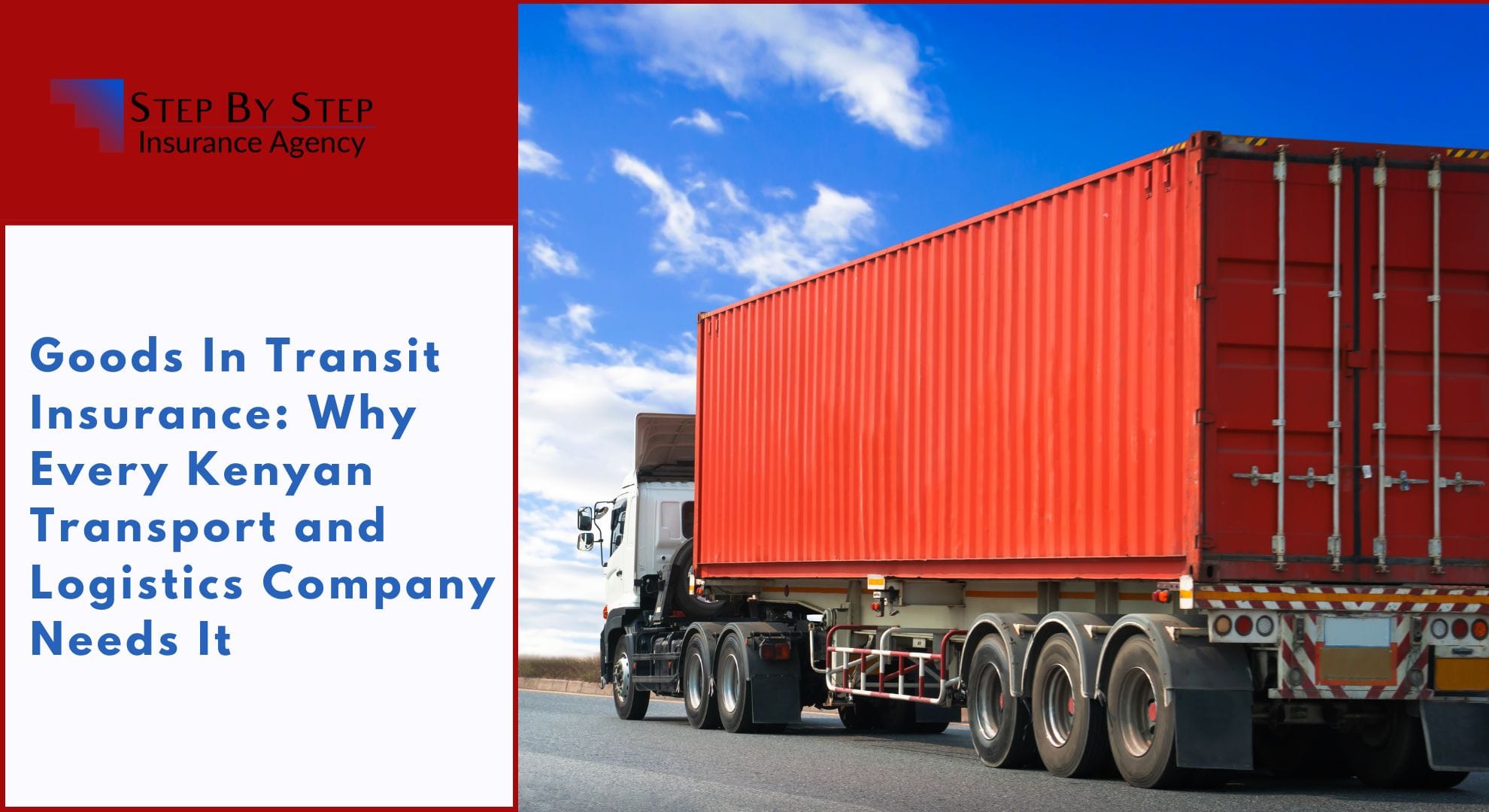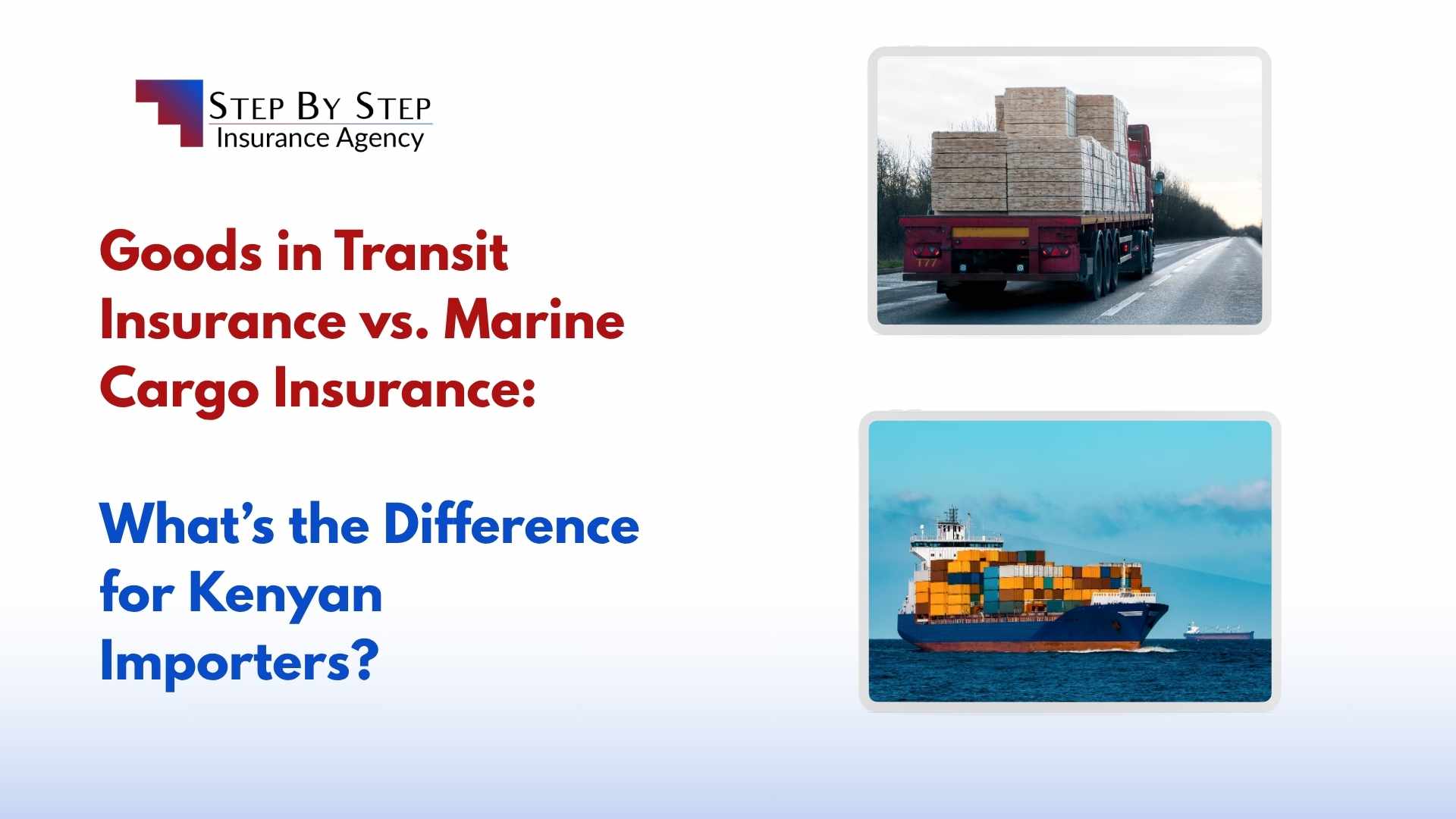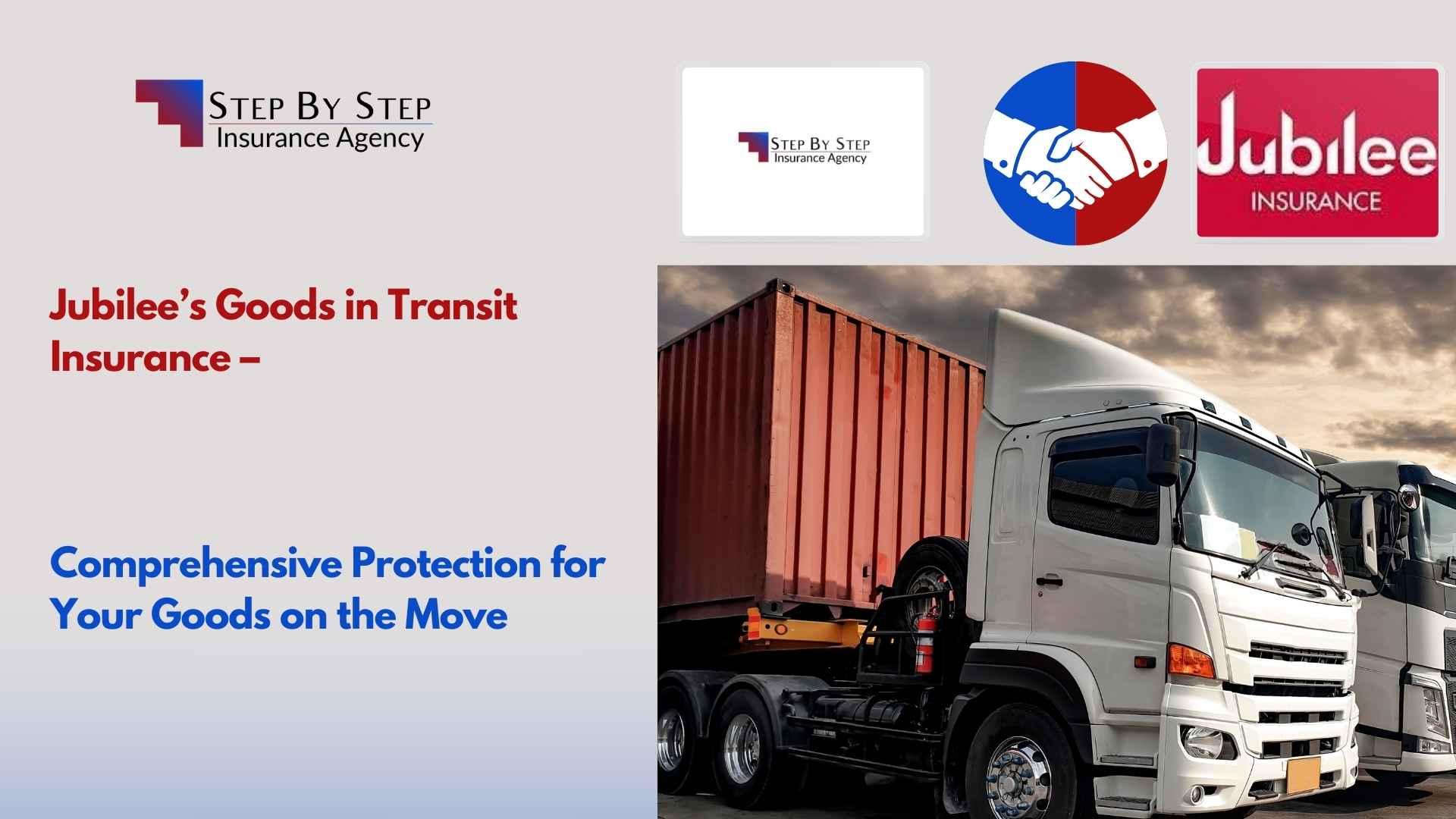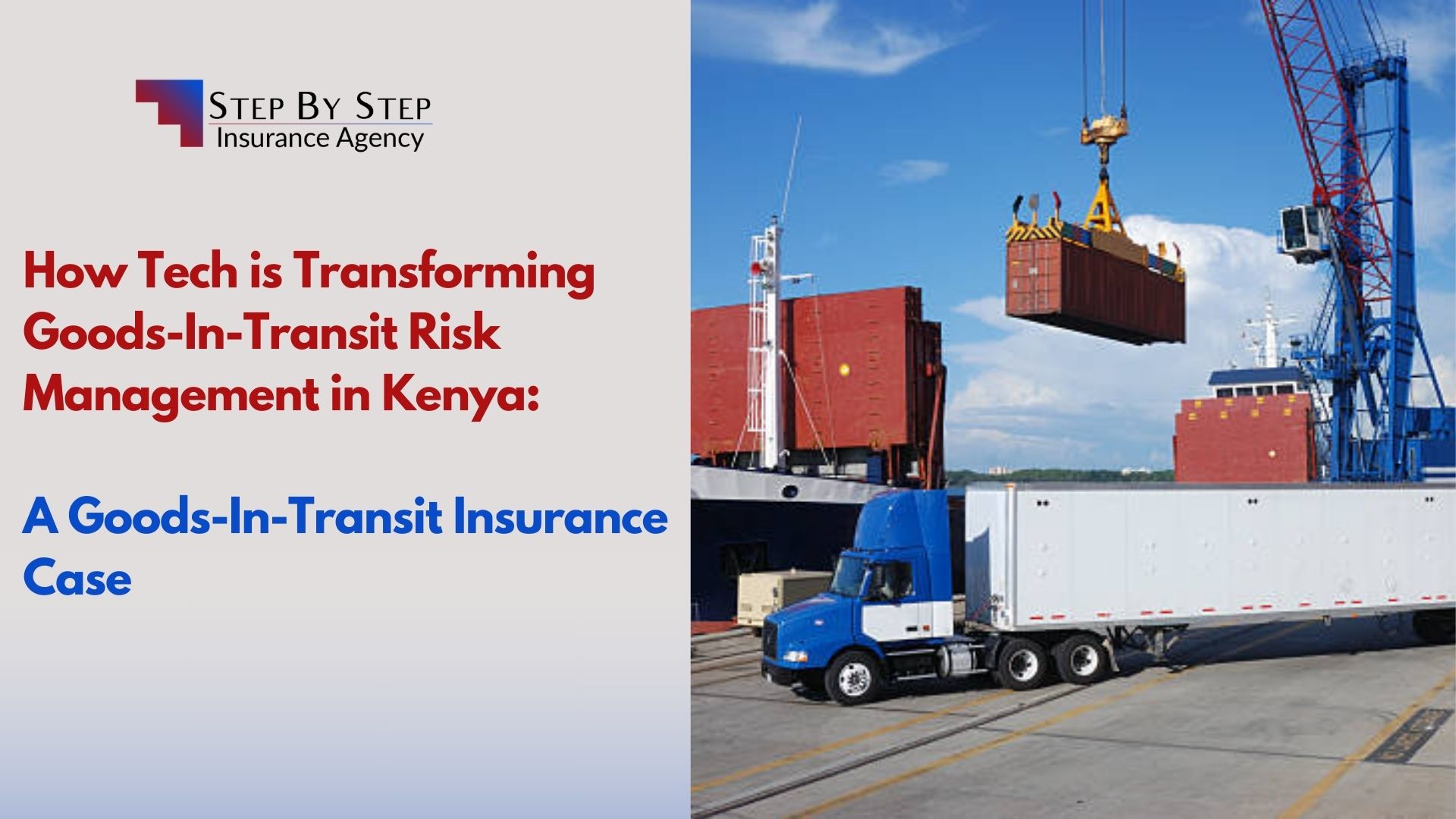Goods In Transit Insurance: Why Every Kenyan Transport and Logistics Company Needs It
Kenya’s transport and logistics industry is vital to its economy, facilitating trade, supply chain operations, and commerce within and across borders.
However, this dynamic sector faces a variety of risks, such as theft, road accidents, and environmental hazards.
Goods in Transit (GIT) insurance emerges as an essential safeguard, offering legal, financial, and operational advantages for logistics providers.
By securing GIT insurance, logistics providers can focus on their core mission, delivering goods safely and efficiently while building resilience in a highly competitive and unpredictable industry.
With the country positioned as a regional hub in East Africa, the demand for efficient and reliable logistics services continues to rise.
This growth, however, brings an array of risks that threaten the stability and profitability of logistics operations.
The Importance of the Transport and Logistics Sector in Kenya
Kenya’s strategic location, enhanced by its extensive road, rail, air, and sea networks, makes it a vital player in regional trade.
The country handles significant volumes of cargo, from agricultural produce to industrial goods, destined for local consumption and export.
The Nairobi-Mombasa corridor, the Standard Gauge Railway (SGR), and major ports like Mombasa anchor the country’s logistics infrastructure, facilitating both domestic and cross-border trade.
However, the dynamic nature of this sector is fraught with challenges. Theft, road accidents, extreme weather conditions, and infrastructure limitations frequently disrupt cargo movement.
Without adequate financial protection, these disruptions can translate into devastating losses for businesses and their clients.
Goods in Transit (GIT) insurance emerges as an indispensable tool for mitigating these risks, safeguarding businesses, and ensuring operational continuity.
Understanding Goods in Transit (GIT) Insurance
GIT insurance provides financial protection for cargo while it is being transported by road, rail, air, or sea.
It covers the risks of theft, damage, or loss during transit, offering a safety net to transporters, logistics companies, and their clients.
The scope of coverage typically includes:
- Accidental Damage
Coverage for goods damaged in accidents involving the transporting vehicle.
- Theft or Robbery
Protection against the financial impact of stolen goods.
- Natural Disasters
Compensation for goods damaged due to floods, landslides, or other unforeseen natural events.
- Third-Party Liability
Coverage for legal claims arising from accidents impacting third-party goods or property.
- Comprehensive Packages
Policies tailored to specific industries, catering to varied cargo types and transportation methods.
Key Benefits of GIT Insurance
Goods in Transit (GIT) insurance is a critical safeguard for businesses involved in the transportation of goods.
It provides financial protection against risks such as theft, damage, and accidents that may occur while goods are in transit.
For logistics providers and businesses in Kenya, understanding the benefits of GIT insurance ensures seamless operations, financial security, and peace of mind, making it an essential component of a risk management strategy.
1. Legal Compliance and Risk Management
Kenya’s regulatory environment increasingly requires businesses to take proactive steps in managing risks, including securing appropriate insurance.
GIT insurance helps logistics companies meet these compliance requirements while demonstrating accountability and professionalism to clients and partners.
2. Financial Protection Against Losses
Transporting goods involves substantial financial investments, whether in the form of high-value cargo or operational costs.
GIT insurance ensures compensation for goods lost, stolen, or damaged during transit, shielding businesses from crippling financial liabilities.
3. Enhanced Client Confidence
Clients prioritise logistics providers that can guarantee the safe delivery of their goods.
GIT insurance reassures clients that their goods are protected, fostering trust, improving client retention, and enhancing the company’s competitive edge in the market.
4. Operational Continuity
Unexpected losses can disrupt business operations, especially for smaller logistics providers. With GIT insurance, companies can recover quickly from setbacks, ensuring uninterrupted service delivery and long-term operational stability.
5. Coverage for a Wide Range of Risks
Kenya’s transport network spans diverse terrains, from urban centres to rural areas prone to natural hazards and infrastructure challenges.
GIT insurance covers a wide array of risks, including accidents, theft, and weather-related damages, providing comprehensive protection tailored to the local landscape.
6. Safeguards Against Third-Party Claims
In the event of accidents involving third-party goods or property, GIT insurance covers liabilities, preventing potential legal disputes and preserving the company’s reputation.
The Evolving Need for GIT Insurance in Kenya
As Kenya’s transport and logistics sector expands, the stakes grow higher. The rise of e-commerce, regional trade agreements, and increased reliance on digital supply chains necessitate robust risk management strategies.
GIT insurance provides a buffer against potential liabilities, enabling businesses to navigate this evolving landscape with confidence.
- Increasing Trade and Logistics Activities
Kenya’s position as a regional trade hub has led to a surge in transport and logistics operations. With goods constantly moving across borders, the need for insurance to mitigate transit risks has grown significantly. - Rising Incidences of Theft and Damage
As supply chains expand, the risk of theft, vandalism, and damage during transportation has escalated. GIT insurance ensures businesses can recover financially from such losses, maintaining operational stability. - Demand for Supply Chain Resilience
Businesses are prioritising continuity and reliability in their supply chains. GIT insurance provides the assurance that unexpected disruptions won’t result in severe financial setbacks. - Compliance with Regulatory Requirements
Some industries in Kenya are now required to have comprehensive insurance covers for transported goods to meet contractual and legal obligations, making GIT insurance indispensable. - Emergence of New Market Risks
Factors like unpredictable weather, infrastructure challenges, and road safety concerns have added complexity to logistics. GIT insurance helps businesses manage these evolving risks effectively.
Required GIT Insurance Claims Documentation
- Duly completed claim form.
- Police abstract report.
- Purchase invoices/receipts.
- Loading sheet.
- Delivery/Consignment note.
- Any other documentation that may be specified.
Challenges in Goods in Transit (GIT) Insurance in Kenya
Addressing these challenges requires a collaborative effort between insurers, regulators, and businesses to create accessible, transparent, and tailored GIT insurance solutions.
- High Premium Costs
Many businesses, especially small and medium enterprises (SMEs), struggle with the cost of GIT insurance premiums. This can discourage uptake, leaving valuable goods uninsured during transit. - Limited Awareness
A significant number of businesses and transport operators lack adequate knowledge about GIT insurance, its benefits, and how it can protect their assets, leading to underutilization. - Fraudulent Claims
The prevalence of fraudulent claims in the insurance sector increases operational risks for insurers, leading to stricter conditions and higher premiums, which can deter legitimate users. - Complex Policy Terms
The technical jargon and extensive conditions in GIT insurance policies can confuse policyholders, making it difficult for them to fully understand what is covered and what isn’t. - Inadequate Coverage Options
Many insurance providers offer generic policies that fail to address specific risks unique to certain industries or transport modes, leaving gaps in coverage for clients.
Solutions to Challenges in Goods in Transit (GIT) Insurance in Kenya
Implementing these solutions would make GIT insurance more effective, accessible, and reliable for Kenya’s growing transport and logistics sector.
- Affordable Premium Structures
Insurers should develop scalable and flexible premium plans that cater to SMEs and individual transporters. Introducing instalment payment options can make coverage more accessible to a wider audience. - Education and Awareness Campaigns
Conducting workshops, seminars, and online campaigns can help businesses understand the importance and benefits of GIT insurance. This would increase uptake and reduce the risks of uninsured losses. - Enhanced Fraud Detection Mechanisms
Leveraging technology such as AI and data analytics can help insurers identify and prevent fraudulent claims, ensuring fairness and stability in the insurance system. - Simplified Policy Terms
Insurers can create easy-to-understand policies with straightforward terms and conditions. Providing customer support to explain the coverage details further reduces confusion among policyholders. - Customizable Coverage Options
Offering industry-specific policies that cater to the unique needs of different sectors can ensure adequate protection. For instance, covering risks specific to perishable goods or high-value items can bridge gaps in existing policies.
GIT insurance is no longer an optional expense but a strategic necessity for Kenyan transport and logistics companies. It serves as a financial lifeline, mitigating risks and ensuring that businesses remain resilient in a competitive market.
As the industry evolves, operators must embrace comprehensive insurance solutions to safeguard their assets, uphold client trust, and thrive amidst uncertainties.
Conclusion
Why Every Kenyan Transport and Logistics Company Needs GIT Insurance
In Kenya’s fast-paced and evolving transport and logistics industry, Goods in Transit (GIT) insurance is more than just an operational necessity, it is a strategic investment in business continuity, financial stability, and reputation management.
Whether you’re transporting high-value goods across borders or delivering essential supplies domestically, the risks associated with theft, accidents, and natural calamities can have significant financial repercussions.
By securing GIT insurance, transport and logistics companies can protect their assets, comply with legal requirements, and ensure their customers’ trust. This coverage not only safeguards against potential losses but also enables businesses to thrive in a competitive marketplace by mitigating risks effectively.
For any logistics provider looking to build resilience and maintain an edge, GIT insurance is a non-negotiable part of operations.
As Kenya’s economy continues to grow, having the right coverage ensures that companies remain agile and prepared for unforeseen challenges.
Ready to secure your business? Let Step By Step Insurance help you find the best Goods in Transit policy tailored to your needs. Contact us today for a free consultation and keep your business moving forward with confidence.
#GoodsInTransit #GITInsuranceKenya #LogisticsSolutions #StepByStepInsurance #SecureYourBusiness






